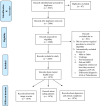Unmet clinical needs in women with polycystic ovary syndrome in regard to mental health: a cross-sectional study
- PMID: 38466411
- PMCID: PMC11018694
- DOI: 10.1007/s00404-024-07452-y
Unmet clinical needs in women with polycystic ovary syndrome in regard to mental health: a cross-sectional study
Abstract
Purpose: Polycystic ovary syndrome (PCOS) management has hardly been standardized until recent years. Despite the existence of a detailed, evidence-based guideline published by the European Society of Human Reproduction and Embryology (ESHRE), it remains unclear to what extent healthcare providers adhere to this guideline. Our aim is to evaluate the gynaecological medical care provided in women with PCOS, particularly in terms of mental health, from the patients' perspective.
Methods: For this cross-sectional online cohort study in women with PCOS, we designed a standardized, non-validated questionnaire covering aesthetic aspects, metabolism, menstrual cycle, reproduction, mental health, and prevention of chronic non-communicable diseases.
Results: Among 1879 participants, various mental health aspects were reported: body image (n = 1879), eating patterns/habits (n = 1878), and emotional well-being (n = 1874). Although nearly all women (99.7%) reported complaints on at least one session of mental health, consultation rates were low (body image 9.7%, eating patterns/habits 16.6%, emotional well-being 4.4%). Mean satisfaction with counselling on the different domains varied from moderate to fairly satisfying, with scores of 56.0 points (SD 31.7), 53.5 points (SD 32.0), and 63.7 points (SD 30.2), respectively. More complaints were associated with lower satisfaction. The overall satisfaction with the management provided by the healthcare practitioner (HCP) was low, averaging 36.5 points (SD 29.7). Consequently, most women wished for more counselling (58.9%).
Conclusion: Women affected by PCOS are not properly managed according to ESHRE guideline in regard to mental health issues. Overall consultation rates and corresponding satisfaction with management were poor, highlighting the need for significant improvements in healthcare provision.
Keywords: Mental health; Patient satisfaction; Polycystic ovary syndrome; Unmet clinical need.
© 2024. The Author(s).
Conflict of interest statement
The authors declare that no funds, grants, or other support was received during the preparation of this manuscript. The authors have no relevant financial or non-financial interests to disclose.
Figures



Similar articles
-
Unmet clinical needs in women with polycystic ovary syndrome regarding fertility and obesity: a cross-sectional study from the patient's perspective.Arch Gynecol Obstet. 2025 Mar;311(3):851-859. doi: 10.1007/s00404-024-07916-1. Epub 2025 Jan 25. Arch Gynecol Obstet. 2025. PMID: 39862270 Free PMC article.
-
Unmet Clinical Needs in Women with Aesthetic Manifestations of Polycystic Ovary Syndrome: A Cross-Sectional Study.J Womens Health (Larchmt). 2023 Nov;32(11):1241-1248. doi: 10.1089/jwh.2022.0497. Epub 2023 Sep 5. J Womens Health (Larchmt). 2023. PMID: 37669004
-
Recommendations From the 2023 International Evidence-based Guideline for the Assessment and Management of Polycystic Ovary Syndrome.J Clin Endocrinol Metab. 2023 Sep 18;108(10):2447-2469. doi: 10.1210/clinem/dgad463. J Clin Endocrinol Metab. 2023. PMID: 37580314 Free PMC article.
-
Recommendations from the international evidence-based guideline for the assessment and management of polycystic ovary syndrome.Fertil Steril. 2018 Aug;110(3):364-379. doi: 10.1016/j.fertnstert.2018.05.004. Epub 2018 Jul 19. Fertil Steril. 2018. PMID: 30033227 Free PMC article. Review.
-
Direct economic burden of mental health disorders associated with polycystic ovary syndrome: Systematic review and meta-analysis.Elife. 2023 Aug 3;12:e85338. doi: 10.7554/eLife.85338. Elife. 2023. PMID: 37534878 Free PMC article.
Cited by
-
Unmet clinical needs in women with polycystic ovary syndrome regarding fertility and obesity: a cross-sectional study from the patient's perspective.Arch Gynecol Obstet. 2025 Mar;311(3):851-859. doi: 10.1007/s00404-024-07916-1. Epub 2025 Jan 25. Arch Gynecol Obstet. 2025. PMID: 39862270 Free PMC article.
-
Sleep disorders and psychological comorbidities in women with polycystic ovary syndrome - a cross-sectional study.Arch Gynecol Obstet. 2025 Aug;312(2):573-582. doi: 10.1007/s00404-025-08049-9. Epub 2025 May 13. Arch Gynecol Obstet. 2025. PMID: 40358729 Free PMC article.
References
-
- Dunaif A. Insulin resistance and the polycystic ovary syndrome: mechanism and implications for pathogenesis. Endocrin Rev. 1997;18:774–800. - PubMed
Publication types
MeSH terms
LinkOut - more resources
Full Text Sources
Medical
Miscellaneous

